About this course
A practical, pioneering MSc course, focusing on immersive technology tools and techniques for the development of virtual and augmented reality systems.
Please note that this programme has been suspended for 2024 entry. We will not be accepting applications for September 2024.
- Embark on this newly developed course focussing on a topic of great recent and predicted growth
- Learn how to use and develop a range of tools, techniques and systems for Virtual/Augmented/Mixed Reality
- Experience one of the first MSc courses in the UK to focus on the development of VR/AR applications and systems development
- Benefit from the experience of academics with substantial experience in 3D graphics, Computer Games, Virtual Reality and Augmented Reality and with substantial industrial collaboration
A pioneering MSc in the UK that will prepare graduates for a career in industry or academia. Virtual and Augmented reality content is expected to expand in all domains, from sport and leisure to training, entertainment, advertising, health applications, tourism and many more.
The programme focuses on the development and application of tools and techniques of Virtual Reality and Augmented Reality with a view to producing capable professionals to work in this field.
Dedicated Facilities
A dedicated Lab with high performance workstations, as well as specialised hardware and software is used for the practical work in this programme. Each student is assigned one workstation for the duration of the programme, including the final Dissertation Project.
Career Prospects
There has been sustained growth in labour market demand for workers with skills in the subject in recent year, and it is anticipated that application of Virtual/Augmented Reality technologies will become more mainstream in the future
This is an exciting area with applications in a variety of industrial domains, from training, advertising and marketing, urban planning, medical therapies, computer games, and many others.
Course modules
Discover the building blocks of your programme
Further guidance on modules
Modules are designated core or optional in accordance with professional body requirements, as applicable, and LJMU’s Academic Framework Regulations. Whilst you are required to study core modules, optional modules provide you with an element of choice. Their availability may vary and will be subject to meeting minimum student numbers.
Where changes to modules are necessary these will be communicated as appropriate.
Core modules
Research Methods
20 credits
20 credits
The aim of this module is to develop your knowledge of effective and academic research design at Masters level and provide guidance on the purpose and design of literature reviews; the use of theory; writing strategies; citation and ethical considerations. It provides an understanding of how the range of qualitative, quantitative and mixed method data approaches can be most appropriately applied. It provides the knowledge and research skills you need to:
- establish the most effectual research design and method for the dissertation project and write a successful research proposal
- prepare for the project module and for a possible future research career
Project Dissertation
60 credits
60 credits
This module aims to develop your ability to plan, execute and report in-depth on a major investigation.
Software Engineering Concepts for AR/VR
20 credits
20 credits
This module will introduce you to the Mixed Reality domains, providing both a theoretical perspective on the classification of virtuality and reality, and the associated hardware and software requirements.
Students will be exposed to the current state of the art in AR/VR development by evaluating the hardware, software and middleware requirements of a modern AR/VR solution.
Students will learn the software engineering principles and core algorithms which are used to implement Augmented Reality/Virtual Reality applications using aspects of a modern game engine.
We will focus on the architectural layers of a modern game engine and their relevance to building AR/VR Solutions in tandem with how we integrate AR/VR SDKs into a modern engine and deploy software to AR/VR supporting devices.
We will look at various architectural design strategies and provide in-depth coverage of various core modules and tiers within a game engine. This involves applying realtime programming techniques and data structures, and practically applying them to develop mixed reality applications.
World Design for Virtual Reality
20 credits
20 credits
This module's central focus in on practically constructing three-dimensional virtual worlds for Virtual Reality using Industry standard Digital Content Creation tools and game engine level editing software by employing traditional level design techniques such as Block outs/Grey Boxes, Meshing Passes, Lighting, Post Processing and Polish Passes to construct a Virtual world inside a game engine that can be experienced directly on a real-world Virtual Reality headset. The levels will be tailored to a Virtual Reality environment and deployed to state of the art Virtual Reality headsets to allow students to build immersive, believable virtual spaces for use with VR and XR spaces.
In order to develop a deep understanding of these design techniques, the module will also teach the mathematical concepts required to understand how translation, rotation and scaling to 3D Meshes are applied as well as the concepts which underpin related graphics development areas such as materials, post processing and cameras. Therefore, this module teaches fundamental mathematical techniques such as numerical calculus, analytical geometry, linear algebra and angular concepts.
Advanced Topics in Virtual Reality
20 credits
20 credits
This module explores the theoretical and technical domains that underpin the current state of the art in Virtual Reality development. From fundamental fields of study such as Data Visualisation and Neuro Perception, through to hardware concerns, visual fidelity and real-time rendering approaches required to achieve smooth, immersive environments, you will evaluate and practically apply the latest development techniques to produce a Virtual Reality application, which can incorporate real-world data into a Virtual environment to provide an interactive application based on a Real World Scenario related to fields such as Architectural Visualisation, Engineering and Simulation, Product Configuration.
Collaborative Mixed Reality Project
30 credits
30 credits
This module offers an opportunity for students to undertake a substantial collaborative project. Students will design, implement and evaluate a mixed reality solution in response to a brief provided by industry. Students will critically select, evaluate and deploy a range of techniques on a suitable mixed reality platform that will enable them to meet the aims of the collaborative project. Students will evaluate their contribution to the project via a technical post-mortem.
Emerging Topics in Mobile Extended Reality
10 credits
10 credits
This module explores the hardware, theoretical and technical domains that underpin the current state of the art in Virtual, Augmented and Mixed Reality development, identifying the commonalities between them all, as well as the techniques specific to each domain. From fundamental fields of study such as Mobile Platforms and Hardware Components; Game Engine Architectures for XR/AR/VR; Object, Plane, Facial and Pose Tracking; Scene Estimation; Depth Sensing and Monocular SLAM; environment rendering approximation techniques to state-of-the-art approaches to key aspects such as Occlusion, students will evaluate the latest research trends and development techniques to apply Extended Reality via the fields of Augmented, Virtual and Mixed Reality to various real-world problems.
Your Learning Experience
An insight into teaching on your course
Students should expect between nine and 12 hours of contact per week, in addition to an average of approximately 30 hours of self-study per week throughout the academic year. In the summer term, you will work solely on your project, which has an expected workload of 600 hours.
Our academic staff are leaders in their research fields and will provide you with a platform to enter technology competitions, attend conferences and further your research opportunities.
How learning is monitored on your programme
To cater for the wide-ranging content of our courses and the varied learning preferences of our students, we offer a range of assessment methods on each programme.
Where you will study
What you can expect from your School
Studying at the Byrom Street site in the City Campus, which has recently enjoyed a £6 million investment, you will have access to state-of-the-art laboratories and teaching facilities.
A newly developed, specialist Lab comprising High Spec Workstations and Immersive Technology tools e.g. headsets for Virtual Reality is fully dedicated to the MSc students in the Virtual and Augmented Reality Programme.
We also have over 150 high performance computers including PC/ Linux Workstations and Networked Multimedia PCs for general use, in addition to the campus computing cluster.
Course tutors
Our staff are committed to the highest standards of teaching and learning
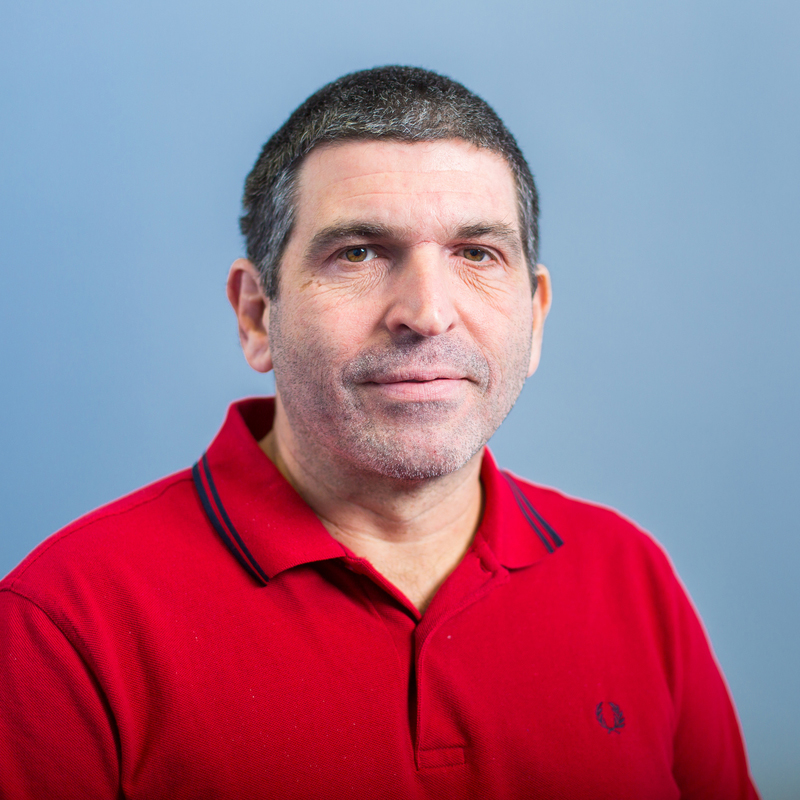
Dr Rubem Pereira
Programme Leader
Before joining the LJMU team, Rubem completed his PhD in Computer Network Performance Modelling in 1997. In the same year he started working at LJMU. He has been a reader in Multimedia Networks and became programme leader for MSc programmes in Computing in 2003. He has also participated in many externally funded projects, supervised PhD students and organised national and international workshops and conferences. Rubem's special areas of interest include: network technologies, distributed systems, video encoding and streaming, the future of Internet, modelling and performance analysis and evaluation of computer systems.
Career paths
Further your career prospects
LJMU has an excellent employability record with 96% (HESA 2018) of our postgraduates in work or further study six months after graduation. Our applied learning techniques and strong industry connections ensure our students are fully prepared for the workplace on graduation and understand how to apply their knowledge in a real world context.
Graduates from this programme can expect to secure technical employment in a wide range industries such as: media, advertising and games, as well as developing applications for health, tourism, industrial training and simulation, building and urban planning, and many others.
Professional accreditation/links
BCS, the Chartered Institute of IT—Partial CITP
Fees and funding
Tuition Fees:
There are many ways to fund postgraduate study for home and international students
Fees
The fees quoted at the top of this page cover registration, tuition, supervision, assessment and examinations as well as:
- library membership with access to printed, multimedia and digital resources
- access to programme-appropriate software
- library and student IT support
- free on-campus wifi via eduroam
Additional costs
Although not all of the following are compulsory/relevant, you should keep in mind the costs of:
- accommodation and living expenditure
- books (should you wish to have your own copies)
- printing, photocopying and stationery
- PC/laptop (should you prefer to purchase your own for independent study and online learning activities)
- mobile phone/tablet (to access online services)
- field trips (travel and activity costs)
- placements (travel expenses and living costs)
- student visas (international students only)
- study abroad opportunities (travel costs, accommodation, visas and immunisations)
- academic conferences (travel costs)
- professional-body membership
- graduation (gown hire etc)
Funding
There are many ways to fund postgraduate study for home and international students. From loans to International Scholarships and subject-specific funding, you’ll find all of the information you need on our specialist postgraduate funding pages.
Please be aware that the UK’s departure from the EU may affect your tuition fees. Learn more about your fee status and which tuition fees are relevant to you.
- International fee:
- £18,250
International Scholarships and payment plans
Liverpool John Moores University is committed to supporting international students by providing a range of scholarships and flexible payment plans to help students manage their tuition fees.
Scholarships
LJMU provides a variety of scholarships to support international students. Scholarships are available to self-funded students who have accepted their offer and met all the conditions outlined in their offer letter. Students must also demonstrate that they can cover living costs, travel, and other expenses associated to studying at the university. Postgraduate scholarships include tuition fee reductions and are often offered in partnership with external funding organisations.
All self-funded international students are eligible for an automatic scholarship worth up to £4,000. For more details and to view our full list of scholarships, visit the international scholarship webpages.
Deposit
All students must pay a £5,000 deposit before they can receive their CAS letter.
For more information view our deposit page.
Tuition Fee Payment Plan
After paying their £5,000 deposit, students have the option to pay their fees in full or in three equal instalments minus any internal scholarships and discounts. There are two payment options available for international students. You can either pay your tuition fees in full before enrolment or opt for a payment plan. With the payment plan, you can pay your fees in three instalments after making your £5,000 deposit. The first instalment is due before enrolment.
All payments should be made through Flywire. Full details can be found in the How to Pay Guide.
Early Bird Tuition Fee discount
We are excited to introduce a £500 Early Payment Discount to all self-funded international students. Eligible self-funded students who pay their fees by the required deadlines will get a discount which will be automatically deducted from the 1st year of tuition fees.
To see the required deadlines please visit the webpage
Entry requirements
You will need:
Qualification requirements
Undergraduate degree
- A Honours degree in a cognate subject area
or
- An undergraduate degree in a non-cognate subject area when supplemented by relevant skills and / or experience
or
- Degree equivalent professional qualifications, e.g. BCS Graduate Diploma in IT
or
- A HND plus a minimum of three years relevant professional experience
Further information
- Extra Requirements
-
RPL
RPL is accepted in this programme
International requirements
IELTS
IELTS 6.0 (Minimum 5.5 on each component)
How to apply
Securing your place at LJMU
Your student experience
There's so much more to university than just studying for a degree.
Talk to our students
Connect with a current LJMU student through Unibuddy for insights and advice on university life, courses, and more.
See what our students are saying
At LJMU we want you to know you’re making the right choice by studying with us. You can see what our students are saying about their experience with us through their reviews on the following websites:
Related Links
News and views
Browse through the latest stories and updates from the University and beyond

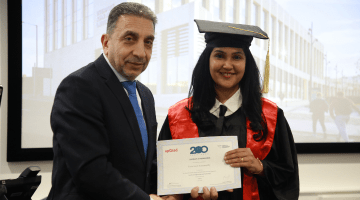
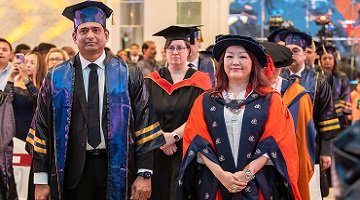
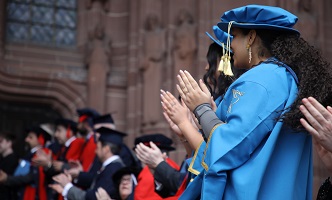

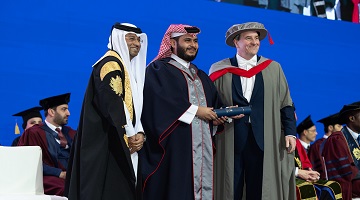
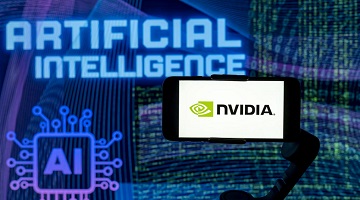

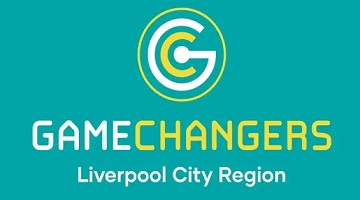

The University reserves the right to withdraw or make alterations to a course and facilities if necessary; this may be because such changes are deemed to be beneficial to students, are minor in nature and unlikely to impact negatively upon students or become necessary due to circumstances beyond the control of the University. Where this does happen, the University operates a policy of consultation, advice and support to all enrolled students affected by the proposed change to their course or module.








